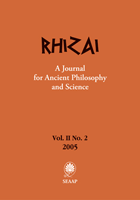The Timaeus on Sounds and Hearing with Some Implications for Plato’s General Account of Sense-Perception
The Timaeus on Sounds and Hearing with Some Implications for Plato’s General Account of Sense-Perception
Author(s): Péter LautnerSubject(s): Philosophy
Published by: Издателство »Изток-Запад«
Keywords: hearing; sound; sense-perception; awareness; parts of the soul; marrow; physiology of sense-perception
Summary/Abstract: The aim of this paper is twofold. First, it may be clear that ears play a role quite different from that of the other sense-organs. Unlike the eyes, nose and tongue, ears cannot be called genuine sense-organs. They only transmit the blow in the air to the brain and the blood in the head that receive the blow. Second, since hearing is defined as a motion extending from the brain to the region around the liver, there is a possibility to assume that the same sound can be grasped by the rational and the appetitive parts of the soul. It gives rise to different emotions: joy in the wise (whose soul is governed by reason) and pleasure in the fool. Furthermore, if sound affects the brain and through the brain it reaches the rational soul, then one may suppose that human reason is open to direct influences from the sensible world and plays a central role in sense-perception.
Journal: Rhizai. A Journal for Ancient Philosophy and Science
- Issue Year: II/2005
- Issue No: 2
- Page Range: 235-253
- Page Count: 19
- Language: English
- Content File-PDF

